|
MySQL 5.6.14 Source Code Document
|
|
MySQL 5.6.14 Source Code Document
|
#include "fil0fil.h"#include <debug_sync.h>#include <my_dbug.h>#include "mem0mem.h"#include "hash0hash.h"#include "os0file.h"#include "mach0data.h"#include "buf0buf.h"#include "buf0flu.h"#include "log0recv.h"#include "fsp0fsp.h"#include "srv0srv.h"#include "srv0start.h"#include "mtr0mtr.h"#include "mtr0log.h"#include "dict0dict.h"#include "page0page.h"#include "page0zip.h"#include "trx0sys.h"#include "row0mysql.h"#include "buf0lru.h"#include "ibuf0ibuf.h"#include "sync0sync.h"#include "os0sync.h"
Go to the source code of this file.
Classes | |
| struct | fil_node_t |
| struct | fil_space_t |
| struct | fil_system_t |
| struct | fsp_open_info |
| struct | Check |
| struct | fil_iterator_t |
Macros | |
| #define | FIL_NODE_MAGIC_N 89389 |
| #define | FIL_SPACE_MAGIC_N 89472 |
| #define | fil_is_user_tablespace_id(i) ((i) > srv_undo_tablespaces_open) |
| #define | fil_buffering_disabled(s) |
Functions | |
| UNIV_INLINE ibool | fil_space_belongs_in_lru (const fil_space_t *space) |
| UNIV_INLINE dberr_t | fil_read (bool sync, ulint space_id, ulint zip_size, ulint block_offset, ulint byte_offset, ulint len, void *buf, void *message) |
| UNIV_INLINE dberr_t | fil_write (bool sync, ulint space_id, ulint zip_size, ulint block_offset, ulint byte_offset, ulint len, void *buf, void *message) |
| UNIV_INLINE fil_space_t * | fil_space_get_by_id (ulint id) |
| UNIV_INLINE fil_space_t * | fil_space_get_by_name (const char *name) |
| UNIV_INTERN ib_int64_t | fil_space_get_version (ulint id) |
| UNIV_INTERN rw_lock_t * | fil_space_get_latch (ulint id, ulint *flags) |
| UNIV_INTERN ulint | fil_space_get_type (ulint id) |
| UNIV_INTERN char * | fil_node_create (const char *name, ulint size, ulint id, ibool is_raw) |
| UNIV_INTERN ibool | fil_space_create (const char *name, ulint id, ulint flags, ulint purpose) |
| UNIV_INTERN ibool | fil_assign_new_space_id (ulint *space_id) |
| UNIV_INLINE fil_space_t * | fil_space_get_space (ulint id) |
| UNIV_INTERN char * | fil_space_get_first_path (ulint id) |
| UNIV_INTERN ulint | fil_space_get_size (ulint id) |
| UNIV_INTERN ulint | fil_space_get_flags (ulint id) |
| UNIV_INTERN ulint | fil_space_get_zip_size (ulint id) |
| UNIV_INTERN ibool | fil_check_adress_in_tablespace (ulint id, ulint page_no) |
| UNIV_INTERN void | fil_init (ulint hash_size, ulint max_n_open) |
| UNIV_INTERN void | fil_open_log_and_system_tablespace_files (void) |
| UNIV_INTERN void | fil_close_all_files (void) |
| UNIV_INTERN void | fil_close_log_files (bool free) |
| UNIV_INTERN void | fil_set_max_space_id_if_bigger (ulint max_id) |
| static ulint lsn_t ulint arch_log_no | __attribute__ ((unused))) |
| UNIV_INTERN dberr_t | fil_write_flushed_lsn_to_data_files (lsn_t lsn, ulint arch_log_no) |
| UNIV_INTERN const char * | fil_read_first_page (os_file_t data_file, ibool one_read_already, ulint *flags, ulint *space_id, lsn_t *min_flushed_lsn, lsn_t *max_flushed_lsn) |
| UNIV_INTERN ibool | fil_inc_pending_ops (ulint id) |
| UNIV_INTERN void | fil_decr_pending_ops (ulint id) |
| UNIV_INTERN byte * | fil_op_log_parse_or_replay (byte *ptr, byte *end_ptr, ulint type, ulint space_id, ulint log_flags) |
| UNIV_INTERN dberr_t | fil_close_tablespace (trx_t *trx, ulint id) |
| UNIV_INTERN dberr_t | fil_delete_tablespace (ulint id, buf_remove_t buf_remove) |
| UNIV_INTERN ibool | fil_tablespace_is_being_deleted (ulint id) |
| UNIV_INTERN dberr_t | fil_discard_tablespace (ulint id) |
| UNIV_INTERN char * | fil_make_ibd_name (const char *name, bool is_full_path) |
| UNIV_INTERN char * | fil_make_isl_name (const char *name) |
| UNIV_INTERN ibool | fil_rename_tablespace (const char *old_name_in, ulint id, const char *new_name, const char *new_path_in) |
| UNIV_INTERN dberr_t | fil_create_link_file (const char *tablename, const char *filepath) |
| UNIV_INTERN void | fil_delete_link_file (const char *tablename) |
| UNIV_INTERN char * | fil_read_link_file (const char *name) |
| UNIV_INTERN ibool | fil_open_linked_file (const char *tablename, char **remote_filepath, os_file_t *remote_file) |
| UNIV_INTERN dberr_t | fil_create_new_single_table_tablespace (ulint space_id, const char *tablename, const char *dir_path, ulint flags, ulint flags2, ulint size) |
| UNIV_INTERN dberr_t | fil_open_single_table_tablespace (bool validate, bool fix_dict, ulint id, ulint flags, const char *tablename, const char *path_in) |
| UNIV_INTERN dberr_t | fil_load_single_table_tablespaces (void) |
| UNIV_INTERN ibool | fil_tablespace_deleted_or_being_deleted_in_mem (ulint id, ib_int64_t version) |
| UNIV_INTERN ibool | fil_tablespace_exists_in_mem (ulint id) |
| UNIV_INTERN ibool | fil_space_for_table_exists_in_mem (ulint id, const char *name, ibool mark_space, ibool print_error_if_does_not_exist, bool adjust_space, mem_heap_t *heap, table_id_t table_id) |
| UNIV_INTERN ulint | fil_get_space_id_for_table (const char *tablename) |
| UNIV_INTERN ibool | fil_extend_space_to_desired_size (ulint *actual_size, ulint space_id, ulint size_after_extend) |
| UNIV_INTERN ibool | fil_space_reserve_free_extents (ulint id, ulint n_free_now, ulint n_to_reserve) |
| UNIV_INTERN void | fil_space_release_free_extents (ulint id, ulint n_reserved) |
| UNIV_INTERN ulint | fil_space_get_n_reserved_extents (ulint id) |
| UNIV_INTERN dberr_t | fil_io (ulint type, bool sync, ulint space_id, ulint zip_size, ulint block_offset, ulint byte_offset, ulint len, void *buf, void *message) |
| UNIV_INTERN void | fil_aio_wait (ulint segment) |
| UNIV_INTERN void | fil_flush (ulint space_id) |
| UNIV_INTERN void | fil_flush_file_spaces (ulint purpose) |
| UNIV_INTERN ibool | fil_validate (void) |
| UNIV_INTERN ibool | fil_addr_is_null (fil_addr_t addr) |
| UNIV_INTERN ulint | fil_page_get_prev (const byte *page) |
| UNIV_INTERN ulint | fil_page_get_next (const byte *page) |
| UNIV_INTERN void | fil_page_set_type (byte *page, ulint type) |
| UNIV_INTERN ulint | fil_page_get_type (const byte *page) |
| UNIV_INTERN void | fil_close (void) |
| UNIV_INTERN dberr_t | fil_tablespace_iterate (dict_table_t *table, ulint n_io_buffers, PageCallback &callback) |
| UNIV_INTERN void | fil_delete_file (const char *ibd_name) |
| UNIV_INTERN dberr_t | fil_get_space_names (space_name_list_t &space_name_list) |
| UNIV_INTERN void | fil_mtr_rename_log (ulint old_space_id, const char *old_name, ulint new_space_id, const char *new_name, const char *tmp_name, mtr_t *mtr) |
Variables | |
| UNIV_INTERN const char * | fil_path_to_mysql_datadir = "." |
| UNIV_INTERN ulint | fil_n_log_flushes = 0 |
| UNIV_INTERN ulint | fil_n_pending_log_flushes = 0 |
| UNIV_INTERN ulint | fil_n_pending_tablespace_flushes = 0 |
| UNIV_INTERN ulint | fil_n_file_opened = 0 |
| UNIV_INTERN fil_addr_t | fil_addr_null = {FIL_NULL, 0} |
| static ulint | sum_of_sizes |
| static ulint lsn_t | lsn |
| #define fil_buffering_disabled | ( | s | ) |
Determine if user has explicitly disabled fsync().
Definition at line 323 of file fil0fil.cc.
| #define fil_is_user_tablespace_id | ( | i | ) | ((i) > srv_undo_tablespaces_open) |
Determine if (i) is a user tablespace id or not.
Definition at line 319 of file fil0fil.cc.
| #define FIL_NODE_MAGIC_N 89389 |
Value of fil_node_t::magic_n
Definition at line 181 of file fil0fil.cc.
| #define FIL_SPACE_MAGIC_N 89472 |
Value of fil_space_t::magic_n
Definition at line 256 of file fil0fil.cc.
|
new |
< in: archived log number to write
Switch to a different input buffer.
| new_buffer | The new input buffer. |
Definition at line 1886 of file fil0fil.cc.
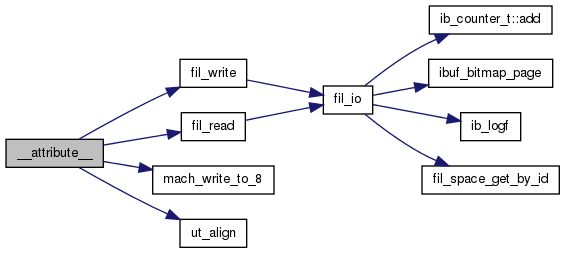
| UNIV_INTERN ibool fil_addr_is_null | ( | fil_addr_t | addr | ) |
Returns TRUE if file address is undefined.
| addr | in: address |
Definition at line 5879 of file fil0fil.cc.
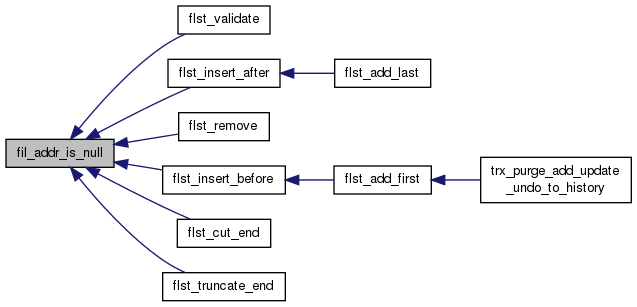
| UNIV_INTERN void fil_aio_wait | ( | ulint | segment | ) |
Waits for an aio operation to complete. This function is used to write the handler for completed requests. The aio array of pending requests is divided into segments (see os0file.cc for more info). The thread specifies which segment it wants to wait for.
| segment | in: the number of the segment in the aio array to wait for |
Definition at line 5549 of file fil0fil.cc.


| UNIV_INTERN ibool fil_assign_new_space_id | ( | ulint * | space_id | ) |
Assigns a new space id for a new single-table tablespace. This works simply by incrementing the global counter. If 4 billion id's is not enough, we may need to recycle id's.
| space_id | in/out: space id |
Definition at line 1343 of file fil0fil.cc.


| UNIV_INTERN ibool fil_check_adress_in_tablespace | ( | ulint | id, |
| ulint | page_no | ||
| ) |
Checks if the pair space, page_no refers to an existing page in a tablespace file space. The tablespace must be cached in the memory cache.
| id | in: space id |
| page_no | in: page number |
Definition at line 1659 of file fil0fil.cc.


| UNIV_INTERN void fil_close | ( | void | ) |
Closes the tablespace memory cache.
Definition at line 5943 of file fil0fil.cc.

| UNIV_INTERN void fil_close_all_files | ( | void | ) |
Closes all open files. There must not be any pending i/o's or not flushed modifications in the files.
Definition at line 1775 of file fil0fil.cc.

| UNIV_INTERN void fil_close_log_files | ( | bool | free | ) |
Closes the redo log files. There must not be any pending i/o's or not flushed modifications in the files.
| free | in: whether to free the memory object |
Definition at line 1810 of file fil0fil.cc.
Closes a single-table tablespace. The tablespace must be cached in the memory cache. Free all pages used by the tablespace.
| trx | in/out: Transaction covering the close |
| id | in: space id |
Definition at line 2620 of file fil0fil.cc.

| UNIV_INTERN dberr_t fil_create_link_file | ( | const char * | tablename, |
| const char * | filepath | ||
| ) |
Creates a new InnoDB Symbolic Link (ISL) file. It is always created under the 'datadir' of MySQL. The datadir is the directory of a running mysqld program. We can refer to it by simply using the path '.'.
| tablename | in: tablename |
| filepath | in: pathname of tablespace |
Definition at line 3172 of file fil0fil.cc.
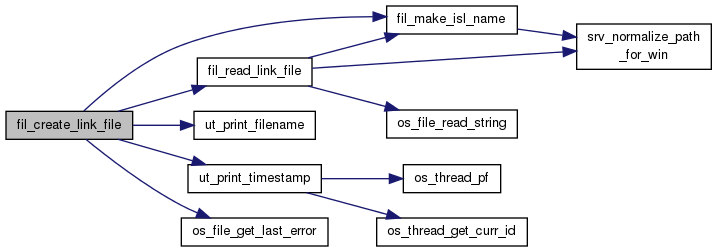
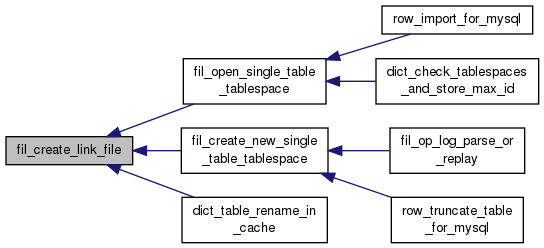
| UNIV_INTERN dberr_t fil_create_new_single_table_tablespace | ( | ulint | space_id, |
| const char * | tablename, | ||
| const char * | dir_path, | ||
| ulint | flags, | ||
| ulint | flags2, | ||
| ulint | size | ||
| ) |
Creates a new single-table tablespace to a database directory of MySQL. Database directories are under the 'datadir' of MySQL. The datadir is the directory of a running mysqld program. We can refer to it by simply the path '.'. Tables created with CREATE TEMPORARY TABLE we place in the temp dir of the mysqld server.
| space_id | in: space id |
| tablename | in: the table name in the usual databasename/tablename format of InnoDB |
| dir_path | in: NULL or a dir path |
| flags | in: tablespace flags |
| flags2 | in: table flags2 |
| size | in: the initial size of the tablespace file in pages, must be >= FIL_IBD_FILE_INITIAL_SIZE |
Definition at line 3355 of file fil0fil.cc.
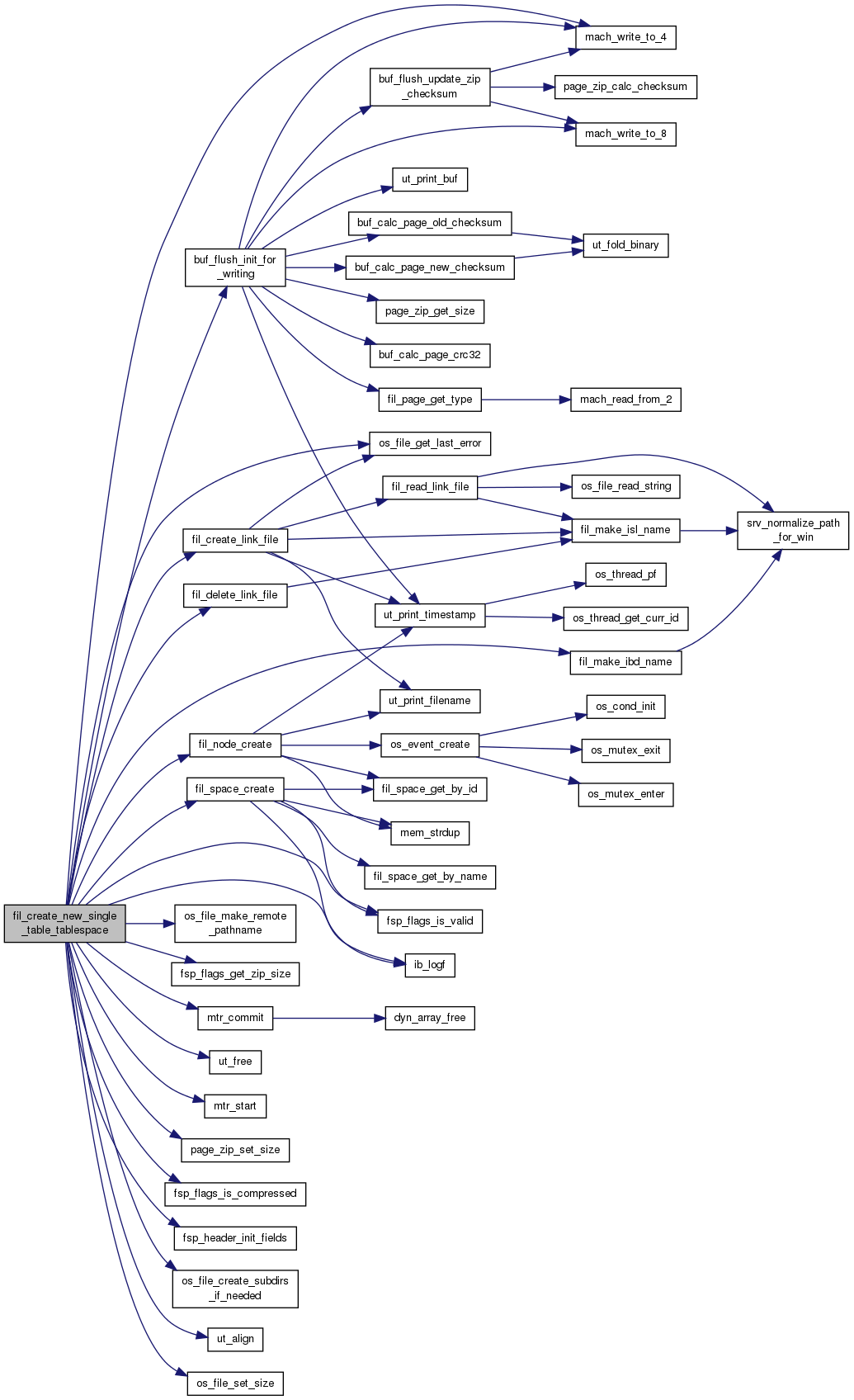
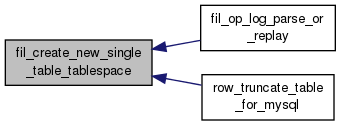
| UNIV_INTERN void fil_decr_pending_ops | ( | ulint | id | ) |
Decrements the count of pending operations.
| id | in: space id |
Definition at line 2144 of file fil0fil.cc.

| UNIV_INTERN void fil_delete_file | ( | const char * | ibd_name | ) |
Delete the tablespace file and any related files like .cfg. This should not be called for temporary tables.
| ibd_name | in: filepath of the ibd tablespace |
Definition at line 6273 of file fil0fil.cc.

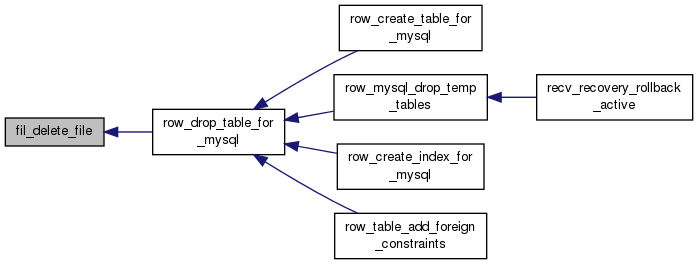
| UNIV_INTERN void fil_delete_link_file | ( | const char * | tablename | ) |
Deletes an InnoDB Symbolic Link (ISL) file.
| tablename | in: name of table |
Definition at line 3245 of file fil0fil.cc.

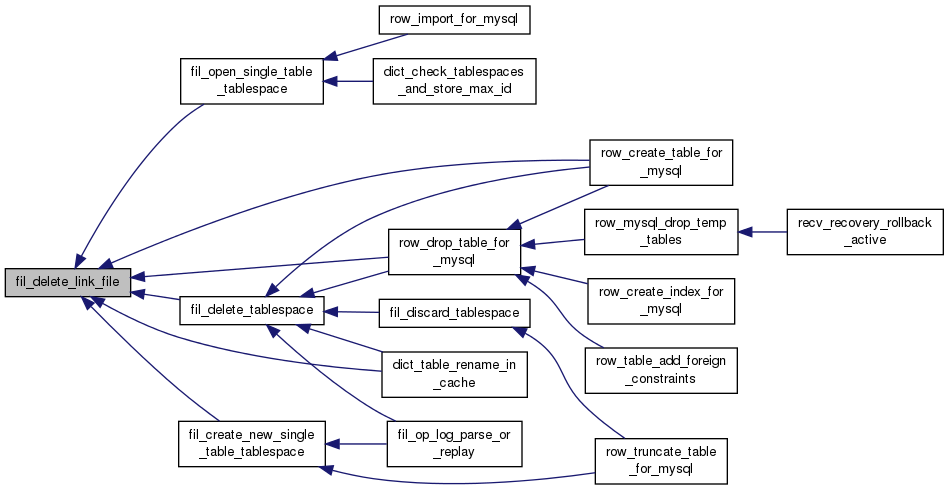
| UNIV_INTERN dberr_t fil_delete_tablespace | ( | ulint | id, |
| buf_remove_t | buf_remove | ||
| ) |
Deletes a single-table tablespace. The tablespace must be cached in the memory cache.
| id | in: space id |
| buf_remove | in: specify the action to take on the tables pages in the buffer pool |
Definition at line 2684 of file fil0fil.cc.
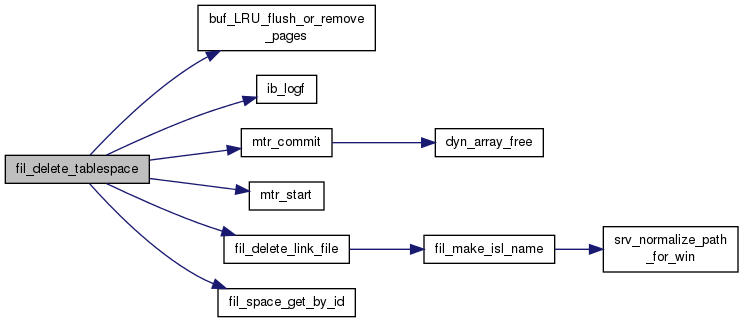
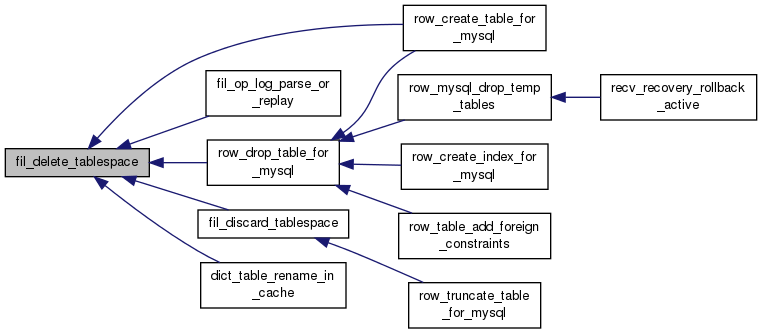
| UNIV_INTERN dberr_t fil_discard_tablespace | ( | ulint | id | ) |
Discards a single-table tablespace. The tablespace must be cached in the memory cache. Discarding is like deleting a tablespace, but
| id | in: space id |
Definition at line 2852 of file fil0fil.cc.
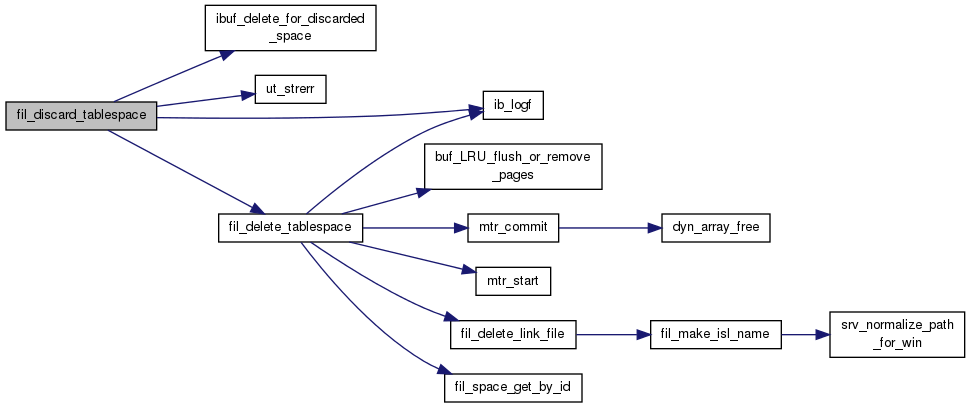

| UNIV_INTERN ibool fil_extend_space_to_desired_size | ( | ulint * | actual_size, |
| ulint | space_id, | ||
| ulint | size_after_extend | ||
| ) |
Tries to extend a data file so that it would accommodate the number of pages given. The tablespace must be cached in the memory cache. If the space is big enough already, does nothing.
| actual_size | out: size of the space after extension; if we ran out of disk space this may be lower than the desired size |
| space_id | in: space id |
| size_after_extend | in: desired size in pages after the extension; if the current space size is bigger than this already, the function does nothing |
Definition at line 4847 of file fil0fil.cc.
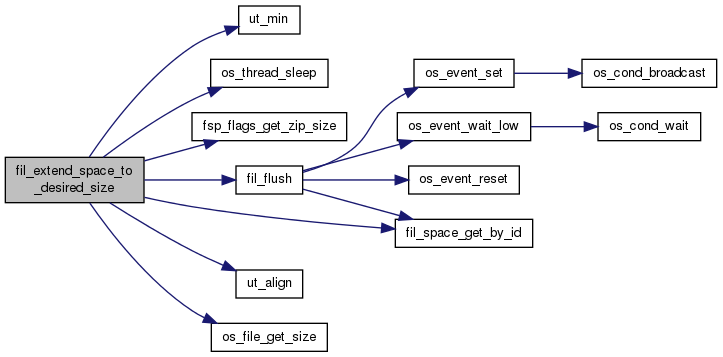
| UNIV_INTERN void fil_flush | ( | ulint | space_id | ) |
Flushes to disk possible writes cached by the OS. If the space does not exist or is being dropped, does not do anything.
< prevent dropping of the space while we are flushing
| space_id | in: file space id (this can be a group of log files or a tablespace of the database) |
Definition at line 5617 of file fil0fil.cc.
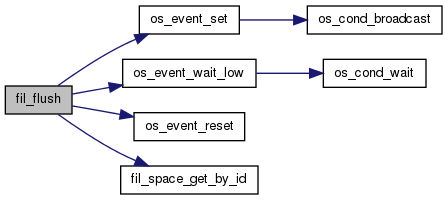
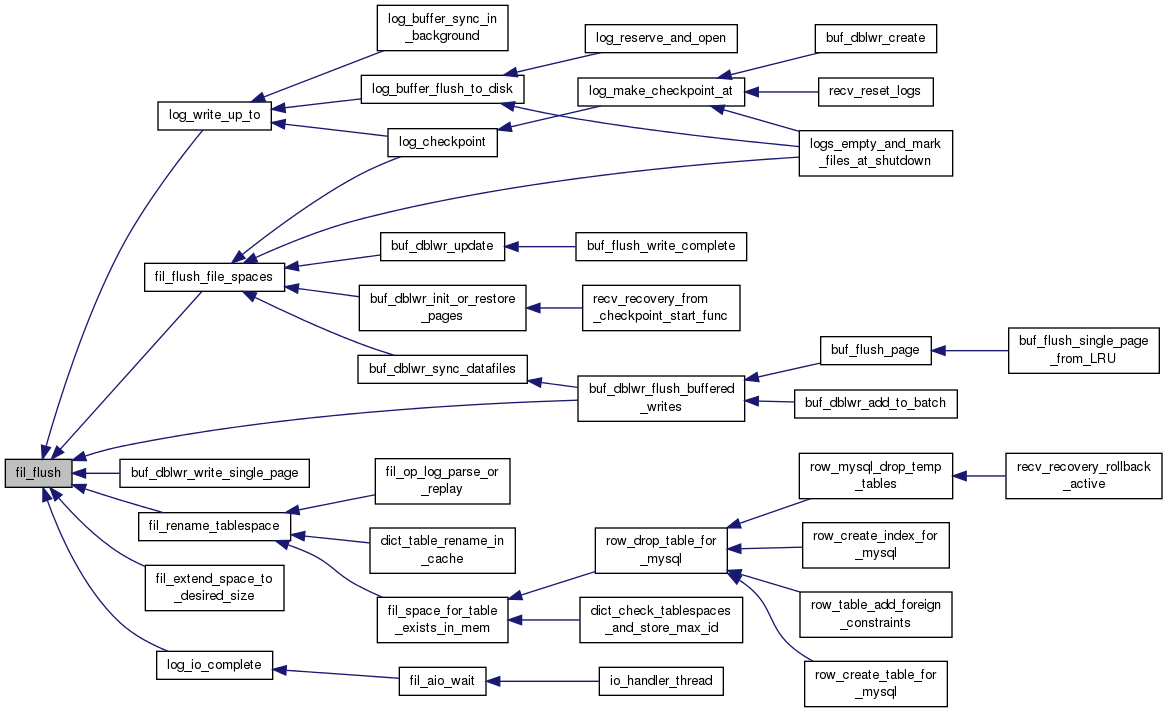
| UNIV_INTERN void fil_flush_file_spaces | ( | ulint | purpose | ) |
Flushes to disk the writes in file spaces of the given type possibly cached by the OS.
| purpose | in: FIL_TABLESPACE, FIL_LOG |
Definition at line 5755 of file fil0fil.cc.


| UNIV_INTERN ulint fil_get_space_id_for_table | ( | const char * | tablename | ) |
Checks if a single-table tablespace for a given table name exists in the tablespace memory cache.
| tablename | in: table name in the standard 'databasename/tablename' format |
Definition at line 4815 of file fil0fil.cc.


| UNIV_INTERN dberr_t fil_get_space_names | ( | space_name_list_t & | space_name_list | ) |
Iterate over all the spaces in the space list and fetch the tablespace names. It will return a copy of the name that must be freed by the caller using: delete[].
| space_name_list | in/out: List to append to |
Definition at line 6298 of file fil0fil.cc.
| UNIV_INTERN ibool fil_inc_pending_ops | ( | ulint | id | ) |
Increments the count of pending operation, if space is not being deleted.
| id | in: space id |
Definition at line 2110 of file fil0fil.cc.

| UNIV_INTERN void fil_init | ( | ulint | hash_size, |
| ulint | max_n_open | ||
| ) |
Initializes the tablespace memory cache.
| hash_size | in: hash table size |
| max_n_open | in: max number of open files |
Definition at line 1676 of file fil0fil.cc.
| UNIV_INTERN dberr_t fil_io | ( | ulint | type, |
| bool | sync, | ||
| ulint | space_id, | ||
| ulint | zip_size, | ||
| ulint | block_offset, | ||
| ulint | byte_offset, | ||
| ulint | len, | ||
| void * | buf, | ||
| void * | message | ||
| ) |
Reads or writes data. This operation is asynchronous (aio).
| type | in: OS_FILE_READ or OS_FILE_WRITE, ORed to OS_FILE_LOG, if a log i/o and ORed to OS_AIO_SIMULATED_WAKE_LATER if simulated aio and we want to post a batch of i/os; NOTE that a simulated batch may introduce hidden chances of deadlocks, because i/os are not actually handled until all have been posted: use with great caution! |
| sync | in: true if synchronous aio is desired |
| space_id | in: space id |
| zip_size | in: compressed page size in bytes; 0 for uncompressed pages |
| block_offset | in: offset in number of blocks |
| byte_offset | in: remainder of offset in bytes; in aio this must be divisible by the OS block size |
| len | in: how many bytes to read or write; this must not cross a file boundary; in aio this must be a block size multiple |
| buf | in/out: buffer where to store read data or from where to write; in aio this must be appropriately aligned |
| message | in: message for aio handler if non-sync aio used, else ignored |
Definition at line 5295 of file fil0fil.cc.
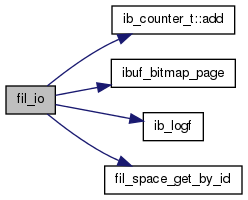
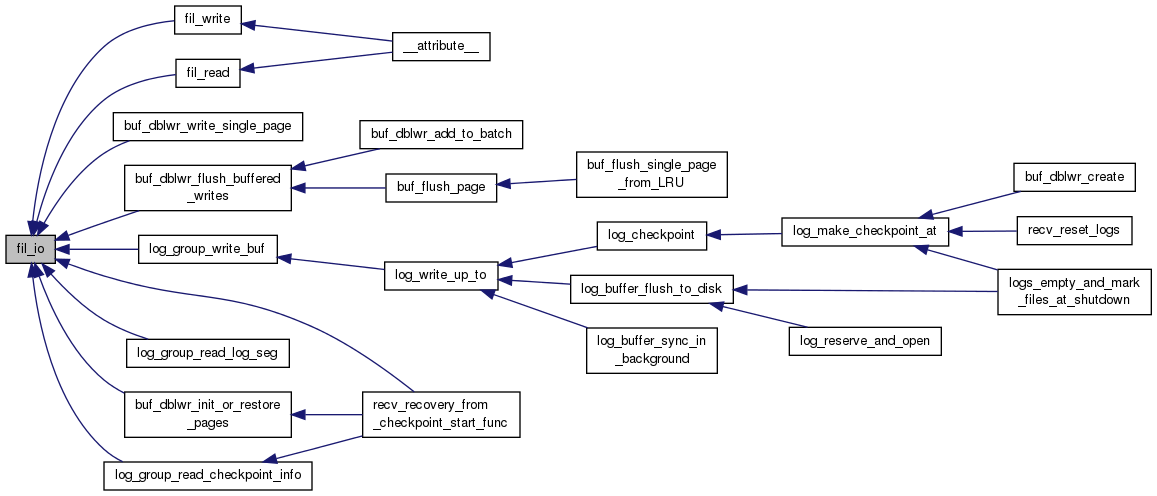
| UNIV_INTERN dberr_t fil_load_single_table_tablespaces | ( | void | ) |
At the server startup, if we need crash recovery, scans the database directories under the MySQL datadir, looking for .ibd files. Those files are single-table tablespaces. We need to know the space id in each of them so that we know into which file we should look to check the contents of a page stored in the doublewrite buffer, also to know where to apply log records where the space id is != 0.
Definition at line 4442 of file fil0fil.cc.
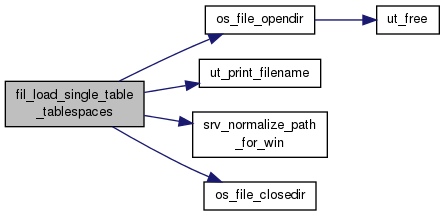
| UNIV_INTERN char* fil_make_ibd_name | ( | const char * | name, |
| bool | is_full_path | ||
| ) |
Allocates a file name for a single-table tablespace. The string must be freed by caller with mem_free().
| name | in: table name or a dir path |
| is_full_path | in: TRUE if it is a dir path |
Definition at line 2942 of file fil0fil.cc.

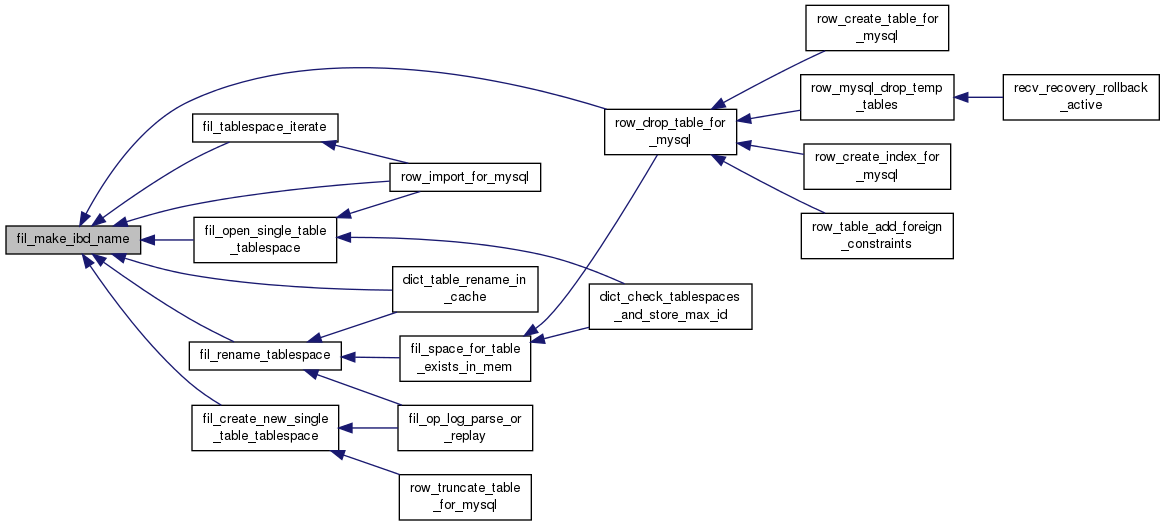
| UNIV_INTERN char* fil_make_isl_name | ( | const char * | name | ) |
Allocates a file name for a tablespace ISL file (InnoDB Symbolic Link). The string must be freed by caller with mem_free().
| name | in: table name |
Definition at line 2974 of file fil0fil.cc.

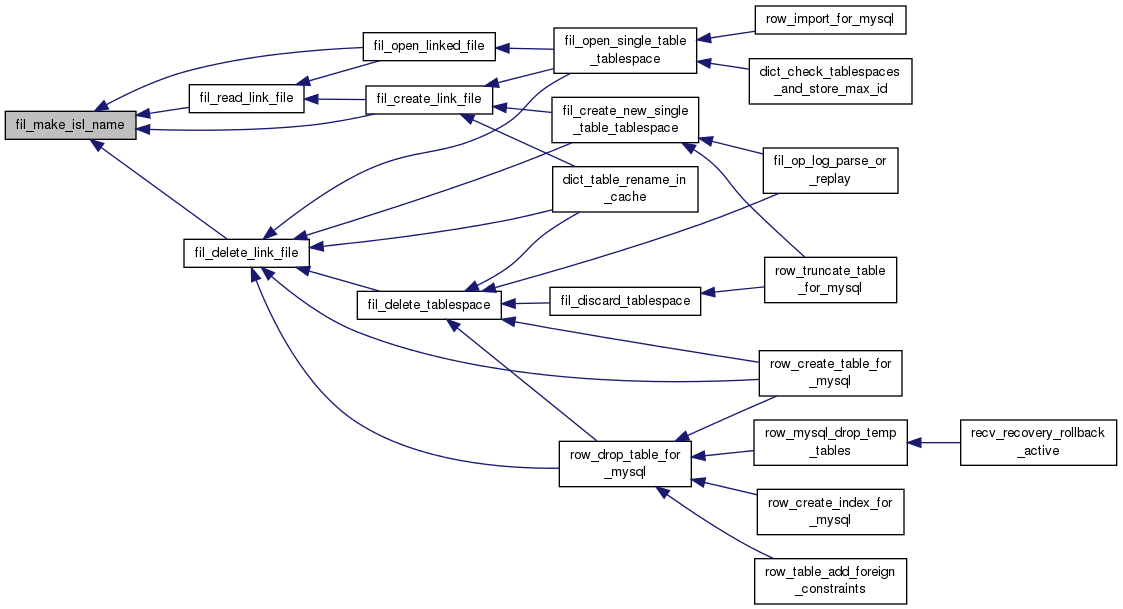
| UNIV_INTERN void fil_mtr_rename_log | ( | ulint | old_space_id, |
| const char * | old_name, | ||
| ulint | new_space_id, | ||
| const char * | new_name, | ||
| const char * | tmp_name, | ||
| mtr_t * | mtr | ||
| ) |
Generate redo logs for swapping two .ibd files
| old_space_id | in: tablespace id of the old table. |
| old_name | in: old table name |
| new_space_id | in: tablespace id of the new table |
| new_name | in: new table name |
| tmp_name | in: temp table name used while swapping |
| mtr | in/out: mini-transaction |
Definition at line 6341 of file fil0fil.cc.
| UNIV_INTERN char* fil_node_create | ( | const char * | name, |
| ulint | size, | ||
| ulint | id, | ||
| ibool | is_raw | ||
| ) |
Appends a new file to the chain of files of a space. File must be closed.
| name | in: file name (file must be closed) |
| size | in: file size in database blocks, rounded downwards to an integer |
| id | in: space id where to append |
| is_raw | in: TRUE if a raw device or a raw disk partition |
Definition at line 632 of file fil0fil.cc.
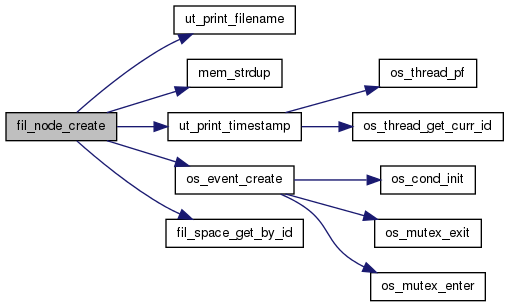
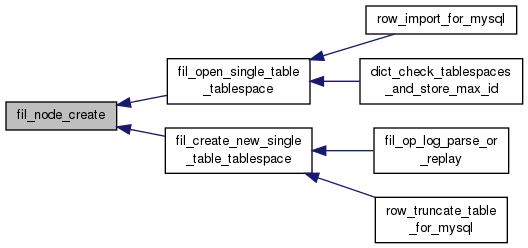
| UNIV_INTERN byte* fil_op_log_parse_or_replay | ( | byte * | ptr, |
| byte * | end_ptr, | ||
| ulint | type, | ||
| ulint | space_id, | ||
| ulint | log_flags | ||
| ) |
Parses the body of a log record written about an .ibd file operation. That is, the log record part after the standard (type, space id, page no) header of the log record.
If desired, also replays the delete or rename operation if the .ibd file exists and the space id in it matches. Replays the create operation if a file at that path does not exist yet. If the database directory for the file to be created does not exist, then we create the directory, too.
Note that ibbackup –apply-log sets fil_path_to_mysql_datadir to point to the datadir that we should use in replaying the file operations.
InnoDB recovery does not replay these fully since it always sets the space id to zero. But ibbackup does replay them. TODO: If remote tablespaces are used, ibbackup will only create tables in the default directory since MLOG_FILE_CREATE and MLOG_FILE_CREATE2 only know the tablename, not the path.
| ptr | in: buffer containing the log record body, or an initial segment of it, if the record does not fir completely between ptr and end_ptr |
| end_ptr | in: buffer end |
| type | in: the type of this log record |
| space_id | in: the space id of the tablespace in question, or 0 if the log record should only be parsed but not replayed |
| log_flags | in: redo log flags (stored in the page number parameter) |
Definition at line 2287 of file fil0fil.cc.
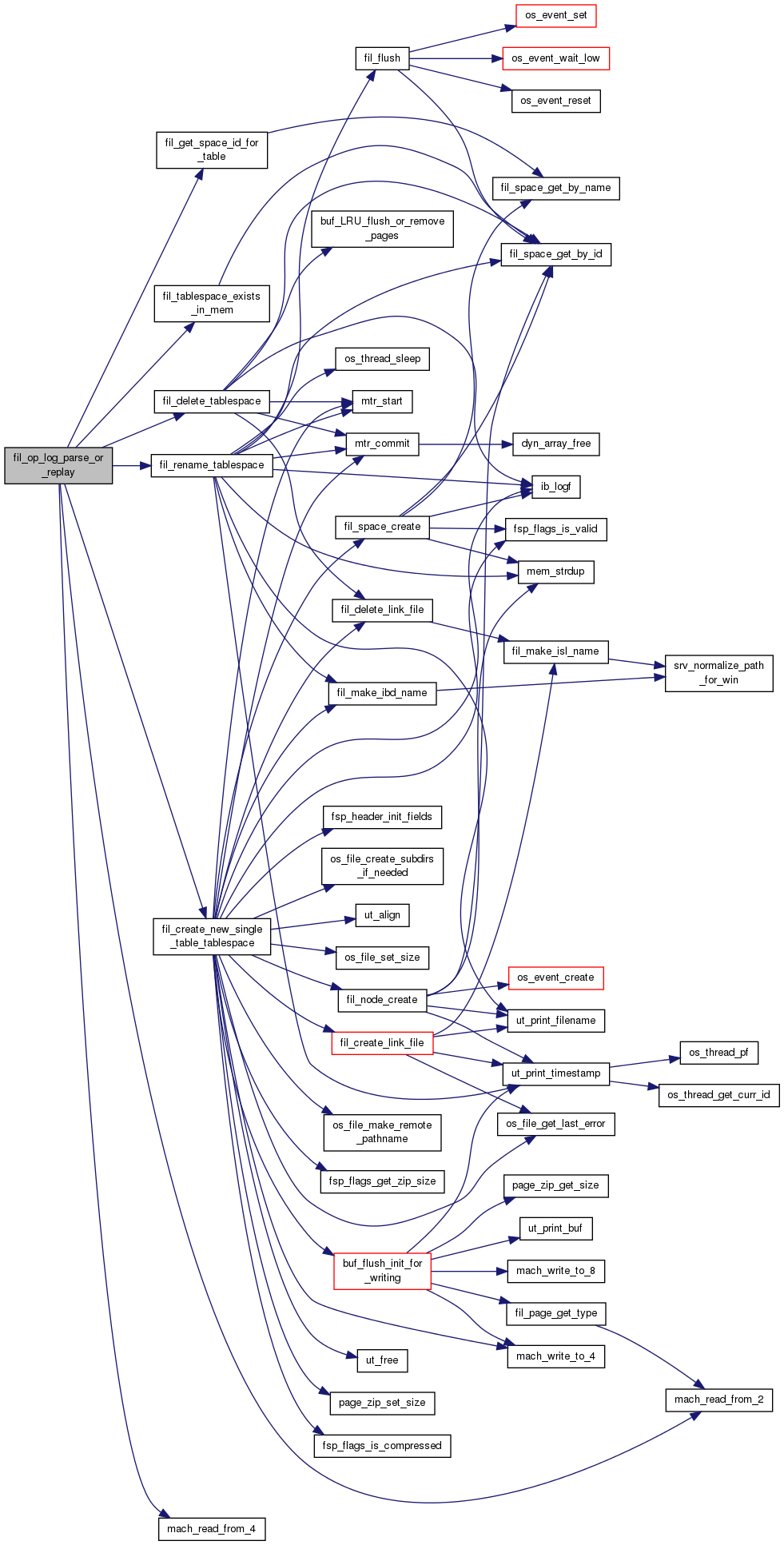
| UNIV_INTERN ibool fil_open_linked_file | ( | const char * | tablename, |
| char ** | remote_filepath, | ||
| os_file_t * | remote_file | ||
| ) |
Opens a handle to the file linked to in an InnoDB Symbolic Link file.
| tablename | in: database/tablename |
| remote_filepath | out: remote filepath |
| remote_file | out: remote file handle |
Definition at line 3304 of file fil0fil.cc.


| UNIV_INTERN void fil_open_log_and_system_tablespace_files | ( | void | ) |
Opens all log files and system tablespace data files. They stay open until the database server shutdown. This should be called at a server startup after the space objects for the log and the system tablespace have been created. The purpose of this operation is to make sure we never run out of file descriptors if we need to read from the insert buffer or to write to the log.
Definition at line 1708 of file fil0fil.cc.

| UNIV_INTERN dberr_t fil_open_single_table_tablespace | ( | bool | validate, |
| bool | fix_dict, | ||
| ulint | id, | ||
| ulint | flags, | ||
| const char * | tablename, | ||
| const char * | path_in | ||
| ) |
Tries to open a single-table tablespace and optionally checks that the space id in it is correct. If this does not succeed, print an error message to the .err log. This function is used to open a tablespace when we start mysqld after the dictionary has been booted, and also in IMPORT TABLESPACE.
NOTE that we assume this operation is used either at the database startup or under the protection of the dictionary mutex, so that two users cannot race here. This operation does not leave the file associated with the tablespace open, but closes it after we have looked at the space id in it.
If the validate boolean is set, we read the first page of the file and check that the space id in the file is what we expect. We assume that this function runs much faster if no check is made, since accessing the file inode probably is much faster (the OS caches them) than accessing the first page of the file. This boolean may be initially FALSE, but if a remote tablespace is found it will be changed to true.
If the fix_dict boolean is set, then it is safe to use an internal SQL statement to update the dictionary tables if they are incorrect.
| validate | in: Do we validate tablespace? |
| fix_dict | in: Can we fix the dictionary? |
| id | in: space id |
| flags | in: tablespace flags |
| tablename | in: table name in the databasename/tablename format |
| path_in | in: tablespace filepath |
Definition at line 3646 of file fil0fil.cc.
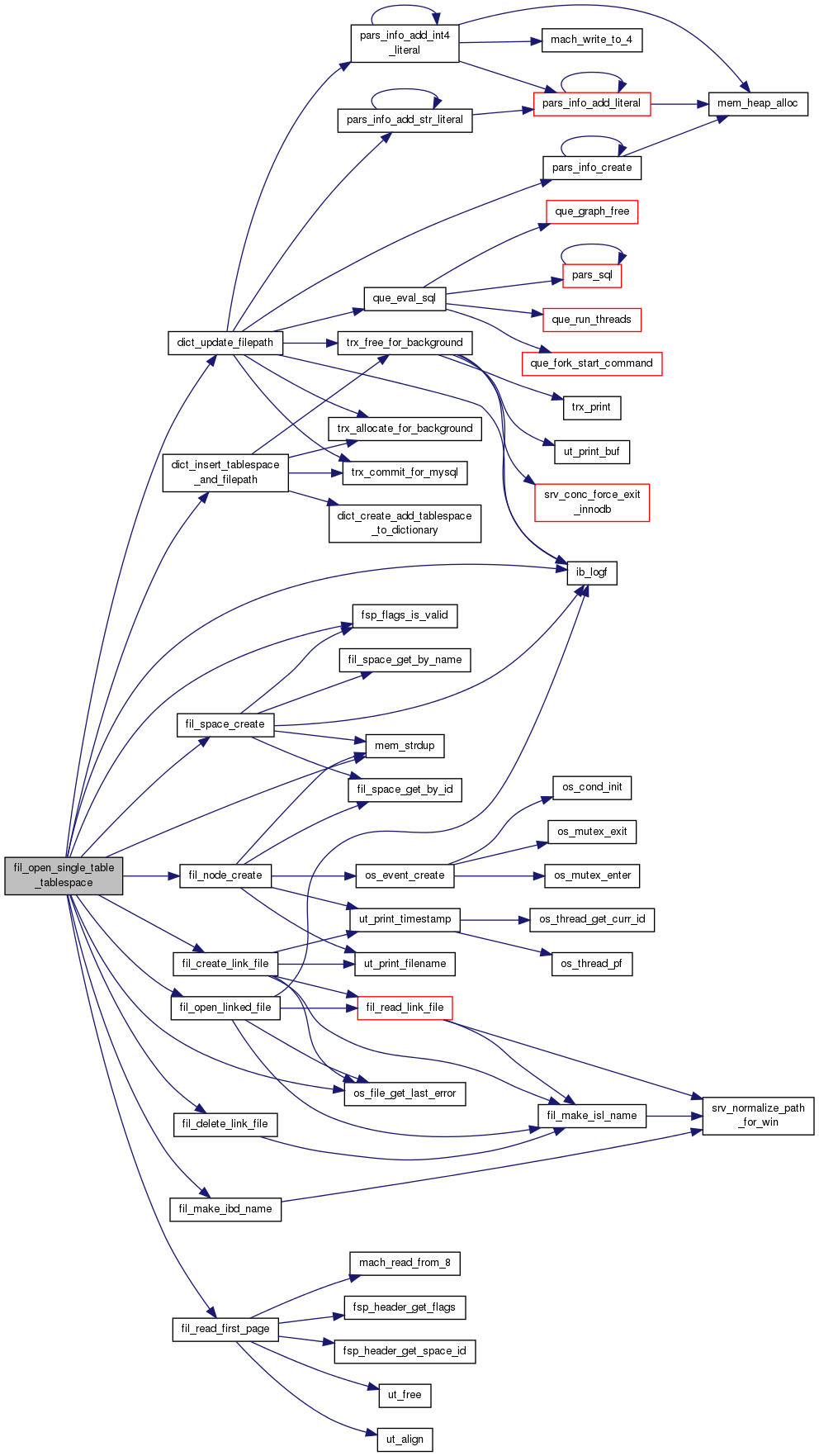

| UNIV_INTERN ulint fil_page_get_next | ( | const byte * | page | ) |
Get the successor of a file page.
| page | in: file page |
Definition at line 5903 of file fil0fil.cc.

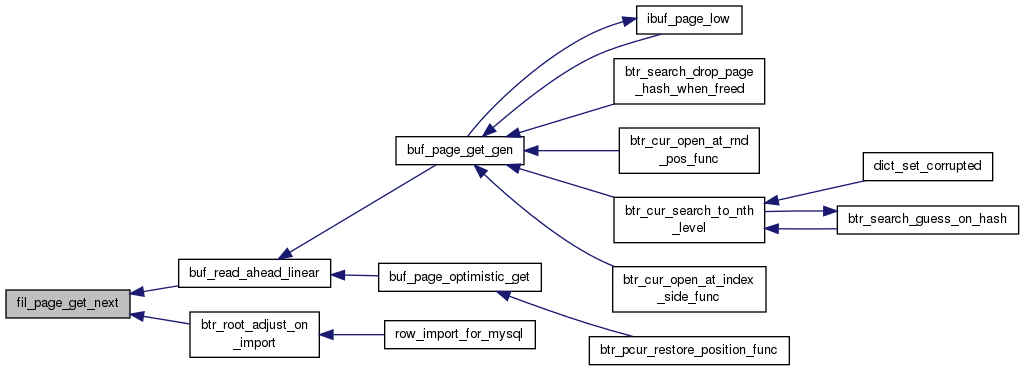
| UNIV_INTERN ulint fil_page_get_prev | ( | const byte * | page | ) |
Get the predecessor of a file page.
| page | in: file page |
Definition at line 5891 of file fil0fil.cc.

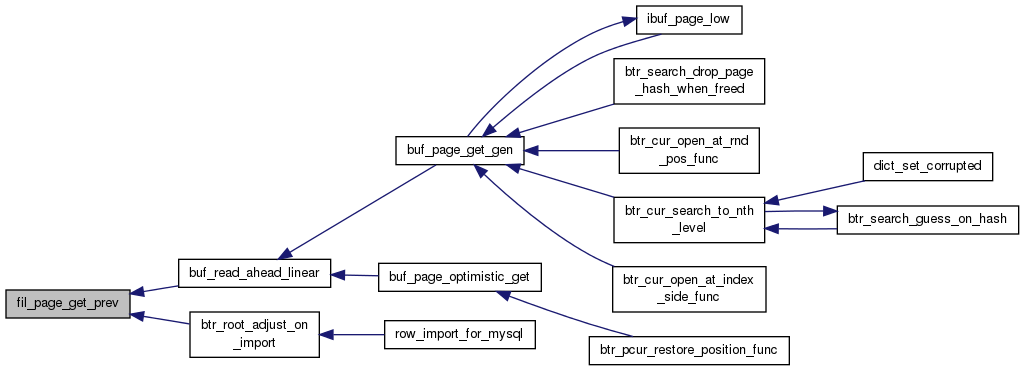
| UNIV_INTERN ulint fil_page_get_type | ( | const byte * | page | ) |
Gets the file page type.
| page | in: file page |
Definition at line 5930 of file fil0fil.cc.

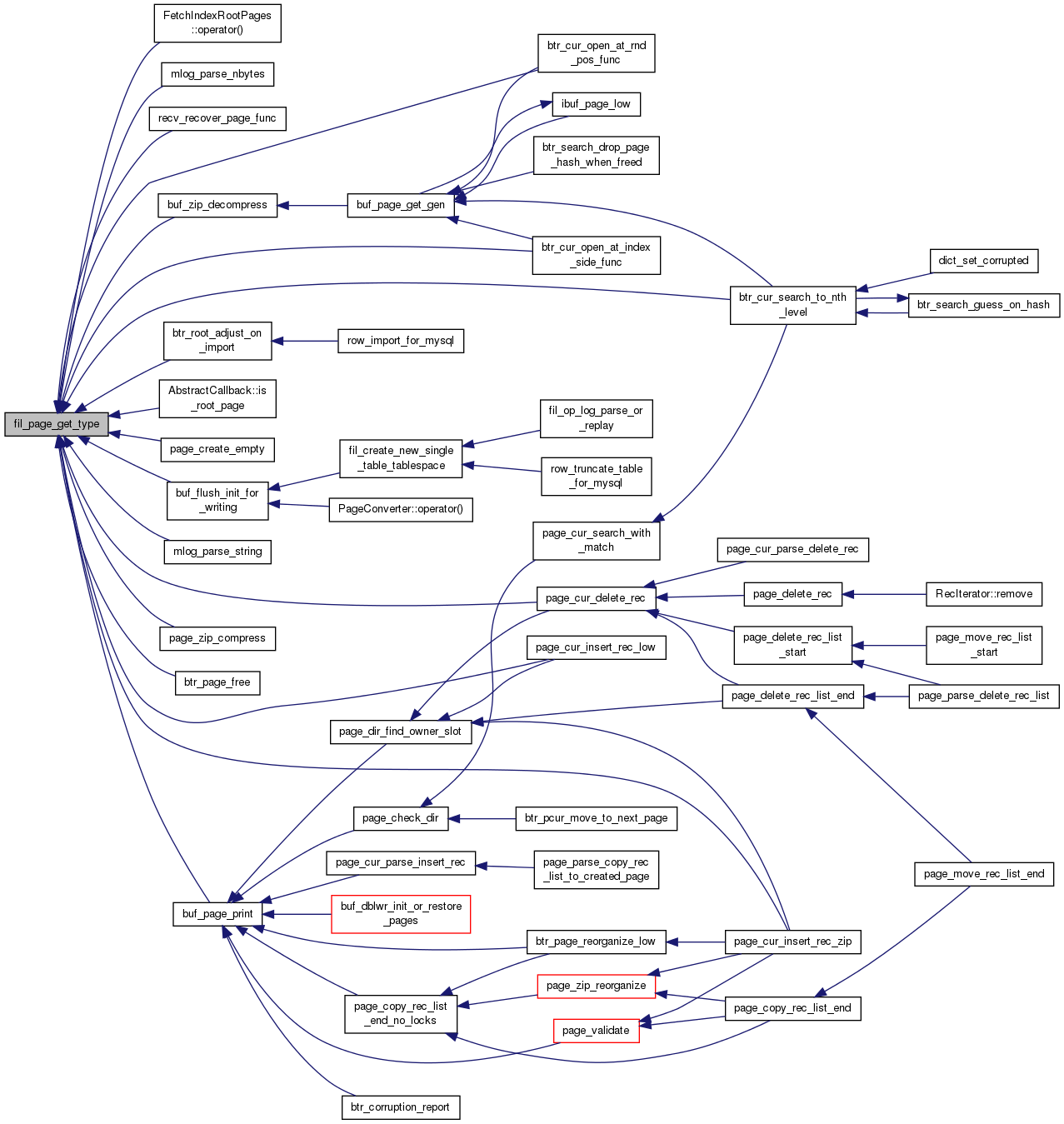
| UNIV_INTERN void fil_page_set_type | ( | byte * | page, |
| ulint | type | ||
| ) |
Sets the file page type.
| page | in/out: file page |
| type | in: type |
Definition at line 5914 of file fil0fil.cc.


| UNIV_INLINE dberr_t fil_read | ( | bool | sync, |
| ulint | space_id, | ||
| ulint | zip_size, | ||
| ulint | block_offset, | ||
| ulint | byte_offset, | ||
| ulint | len, | ||
| void * | buf, | ||
| void * | message | ||
| ) |
Reads data from a space to a buffer. Remember that the possible incomplete blocks at the end of file are ignored: they are not taken into account when calculating the byte offset within a space.
| sync | in: true if synchronous aio is desired |
| space_id | in: space id |
| zip_size | in: compressed page size in bytes; 0 for uncompressed pages |
| block_offset | in: offset in number of blocks |
| byte_offset | in: remainder of offset in bytes; in aio this must be divisible by the OS block size |
| len | in: how many bytes to read; this must not cross a file boundary; in aio this must be a block size multiple |
| buf | in/out: buffer where to store data read; in aio this must be appropriately aligned |
| message | in: message for aio handler if non-sync aio used, else ignored |
Definition at line 420 of file fil0fil.cc.
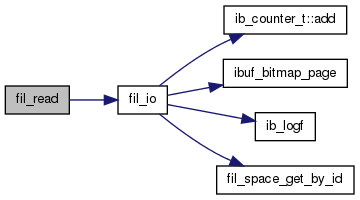

| UNIV_INTERN const char* fil_read_first_page | ( | os_file_t | data_file, |
| ibool | one_read_already, | ||
| ulint * | flags, | ||
| ulint * | space_id, | ||
| lsn_t * | min_flushed_lsn, | ||
| lsn_t * | max_flushed_lsn | ||
| ) |
Reads the flushed lsn, arch no, and tablespace flag fields from a data file at database startup.
| NULL | on success, or if innodb_force_recovery is set |
| data_file | in: open data file |
| one_read_already | in: TRUE if min and max parameters below already contain sensible data |
| flags | out: tablespace flags |
| space_id | out: tablespace ID |
| min_flushed_lsn | out: min of flushed lsn values in data files |
| max_flushed_lsn | out: max of flushed lsn values in data files |
Definition at line 2026 of file fil0fil.cc.
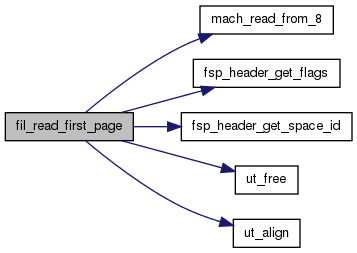

| UNIV_INTERN char* fil_read_link_file | ( | const char * | name | ) |
Reads an InnoDB Symbolic Link (ISL) file. It is always created under the 'datadir' of MySQL. The name is of the form {databasename}/{tablename}. and the isl file is expected to be in a '{databasename}' directory called '{tablename}.isl'. The caller must free the memory of the null-terminated path returned if it is not null.
| name | in: tablespace name |
Definition at line 3265 of file fil0fil.cc.

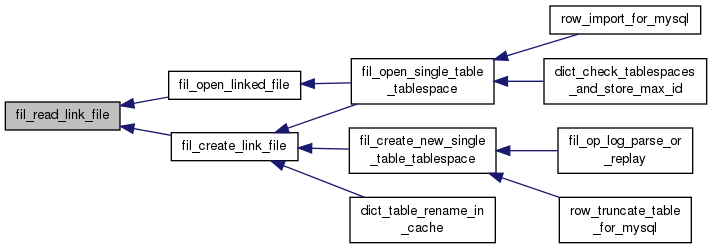
| UNIV_INTERN ibool fil_rename_tablespace | ( | const char * | old_name_in, |
| ulint | id, | ||
| const char * | new_name, | ||
| const char * | new_path_in | ||
| ) |
Renames a single-table tablespace. The tablespace must be cached in the tablespace memory cache.
| old_name_in | in: old table name in the standard databasename/tablename format of InnoDB, or NULL if we do the rename based on the space id only |
| id | in: space id |
| new_name | in: new table name in the standard databasename/tablename format of InnoDB |
| new_path_in | in: new full datafile path if the tablespace is remotely located, or NULL if it is located in the normal data directory. |
Definition at line 2999 of file fil0fil.cc.
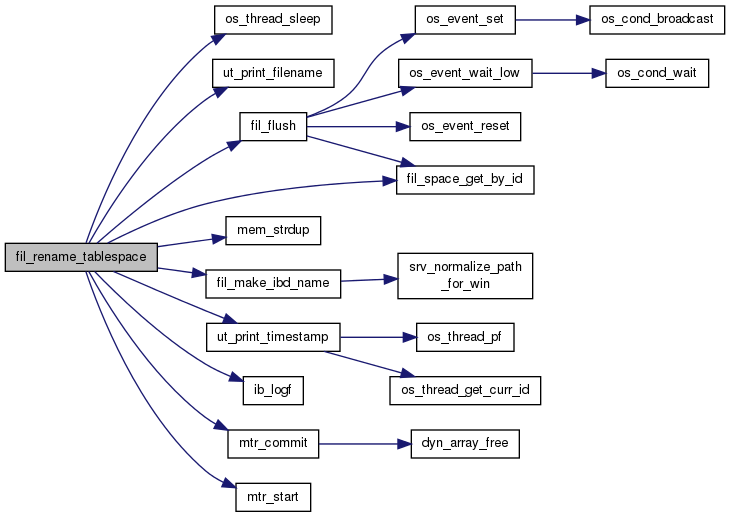

| UNIV_INTERN void fil_set_max_space_id_if_bigger | ( | ulint | max_id | ) |
Sets the max tablespace id counter if the given number is bigger than the previous value.
| max_id | in: maximum known id |
Definition at line 1853 of file fil0fil.cc.

| UNIV_INLINE ibool fil_space_belongs_in_lru | ( | const fil_space_t * | space | ) |
Determines if a file node belongs to the least-recently-used list.
| space | in: file space |
Definition at line 365 of file fil0fil.cc.

| UNIV_INTERN ibool fil_space_create | ( | const char * | name, |
| ulint | id, | ||
| ulint | flags, | ||
| ulint | purpose | ||
| ) |
Creates a space memory object and puts it to the 'fil system' hash table. If there is an error, prints an error message to the .err log.
| name | in: space name |
| id | in: space id |
| flags | in: tablespace flags |
| purpose | in: FIL_TABLESPACE, or FIL_LOG if log |
Definition at line 1231 of file fil0fil.cc.
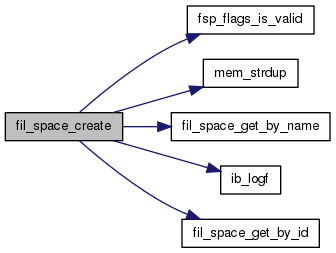
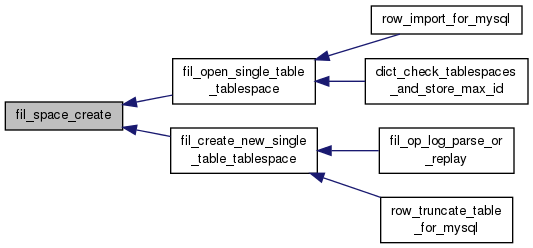
| UNIV_INTERN ibool fil_space_for_table_exists_in_mem | ( | ulint | id, |
| const char * | name, | ||
| ibool | mark_space, | ||
| ibool | print_error_if_does_not_exist, | ||
| bool | adjust_space, | ||
| mem_heap_t * | heap, | ||
| table_id_t | table_id | ||
| ) |
Returns TRUE if a matching tablespace exists in the InnoDB tablespace memory cache. Note that if we have not done a crash recovery at the database startup, there may be many tablespaces which are not yet in the memory cache.
| id | in: space id |
| name | in: table name used in fil_space_create(). Either the standard 'dbname/tablename' format or table->dir_path_of_temp_table |
| mark_space | in: in crash recovery, at database startup we mark all spaces which have an associated table in the InnoDB data dictionary, so that we can print a warning about orphaned tablespaces |
| print_error_if_does_not_exist | in: print detailed error information to the .err log if a matching tablespace is not found from memory |
| adjust_space | in: whether to adjust space id when find table space mismatch |
| heap | in: heap memory |
| table_id | in: table id |
Definition at line 4652 of file fil0fil.cc.
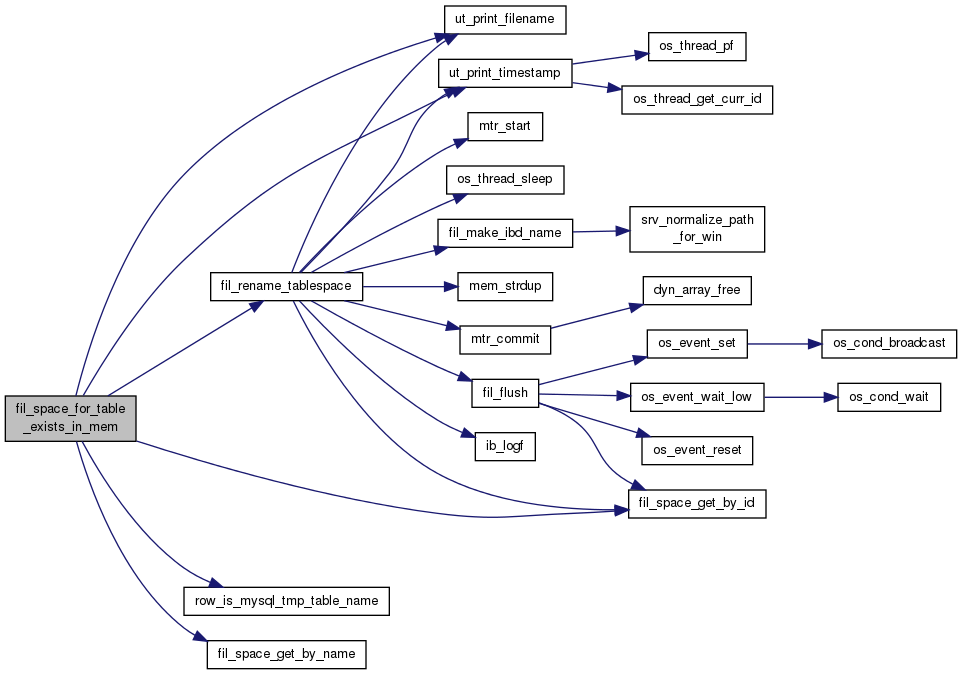
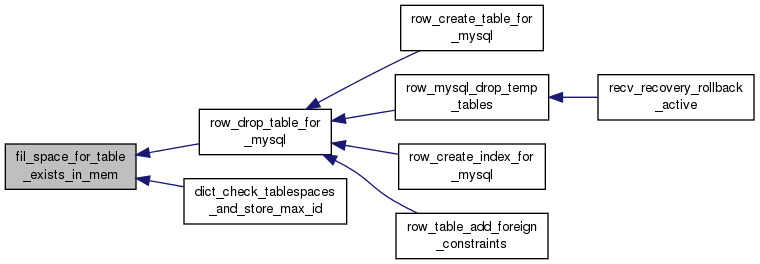
| UNIV_INLINE fil_space_t* fil_space_get_by_id | ( | ulint | id | ) |
Returns the table space by a given id, NULL if not found.
| id | in: space id |
Definition at line 476 of file fil0fil.cc.
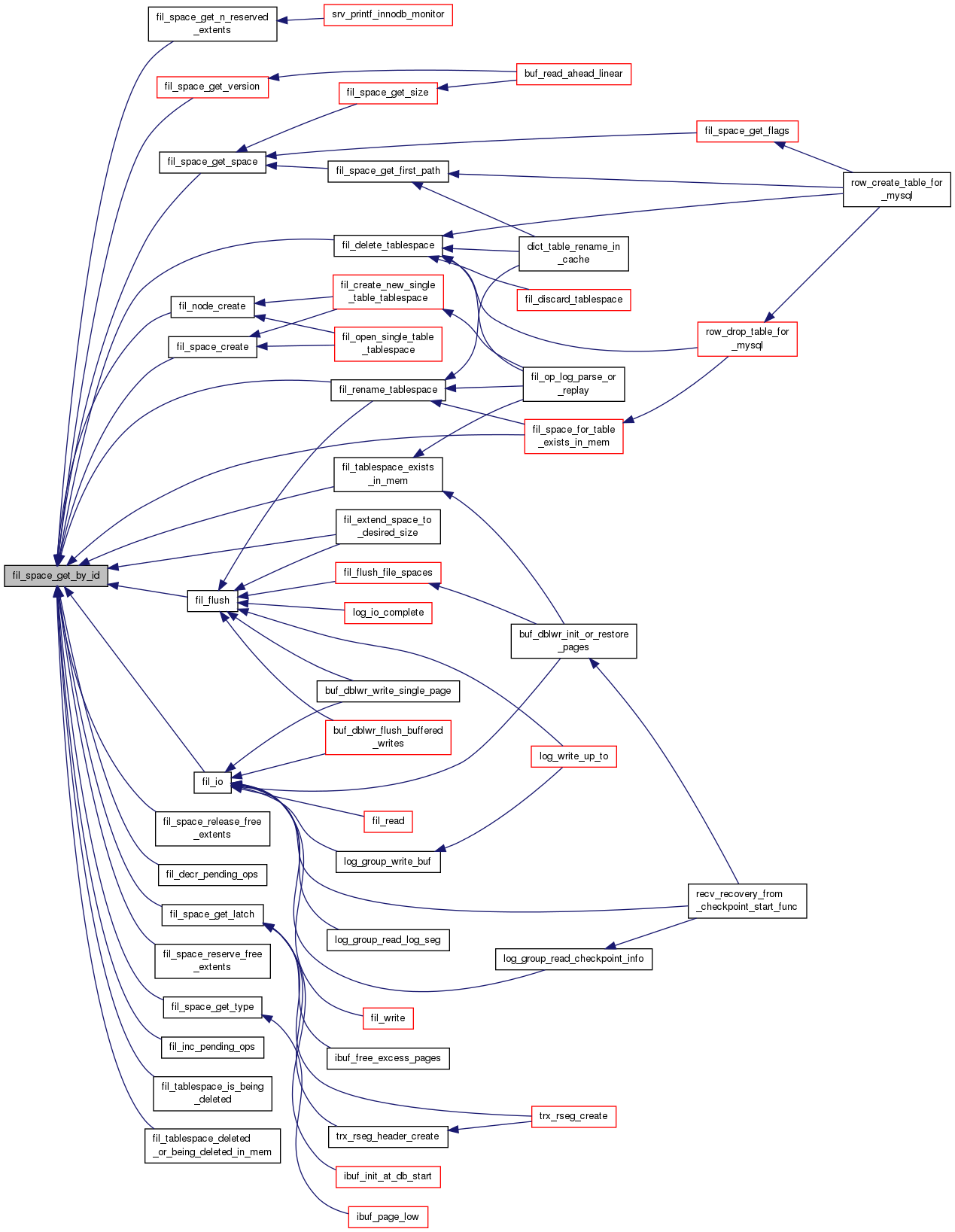
| UNIV_INLINE fil_space_t* fil_space_get_by_name | ( | const char * | name | ) |
Returns the table space by a given name, NULL if not found.
| name | in: space name |
Definition at line 496 of file fil0fil.cc.
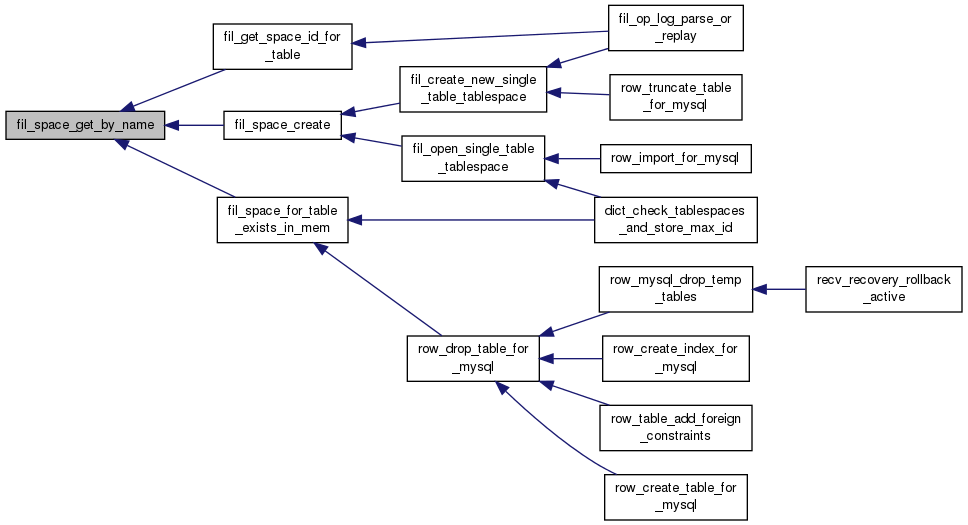
| UNIV_INTERN char* fil_space_get_first_path | ( | ulint | id | ) |
Returns the path from the first fil_node_t found for the space ID sent. The caller is responsible for freeing the memory allocated here for the value returned.
| id | in: space id |
Definition at line 1538 of file fil0fil.cc.

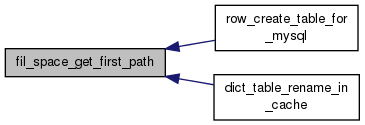
| UNIV_INTERN ulint fil_space_get_flags | ( | ulint | id | ) |
Returns the flags of the space. The tablespace must be cached in the memory cache.
| id | in: space id |
Definition at line 1601 of file fil0fil.cc.

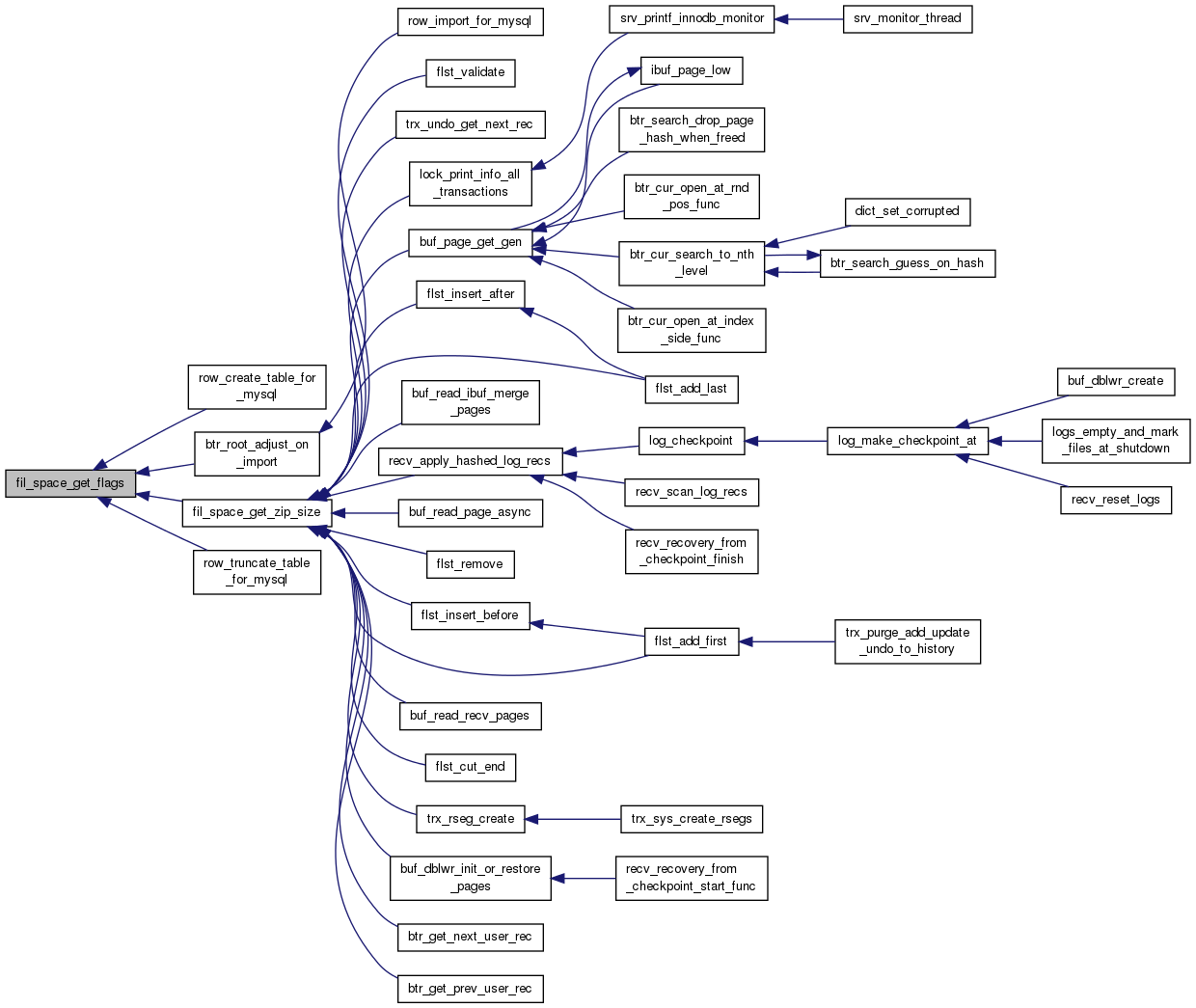
| UNIV_INTERN rw_lock_t* fil_space_get_latch | ( | ulint | id, |
| ulint * | flags | ||
| ) |
Returns the latch of a file space.
| id | in: space id |
| flags | out: tablespace flags |
Definition at line 549 of file fil0fil.cc.


| UNIV_INTERN ulint fil_space_get_n_reserved_extents | ( | ulint | id | ) |
Gets the number of reserved extents. If the database is silent, this number should be zero.
| id | in: space id |
Definition at line 5137 of file fil0fil.cc.


| UNIV_INTERN ulint fil_space_get_size | ( | ulint | id | ) |
Returns the size of the space in pages. The tablespace must be cached in the memory cache.
| id | in: space id |
Definition at line 1576 of file fil0fil.cc.

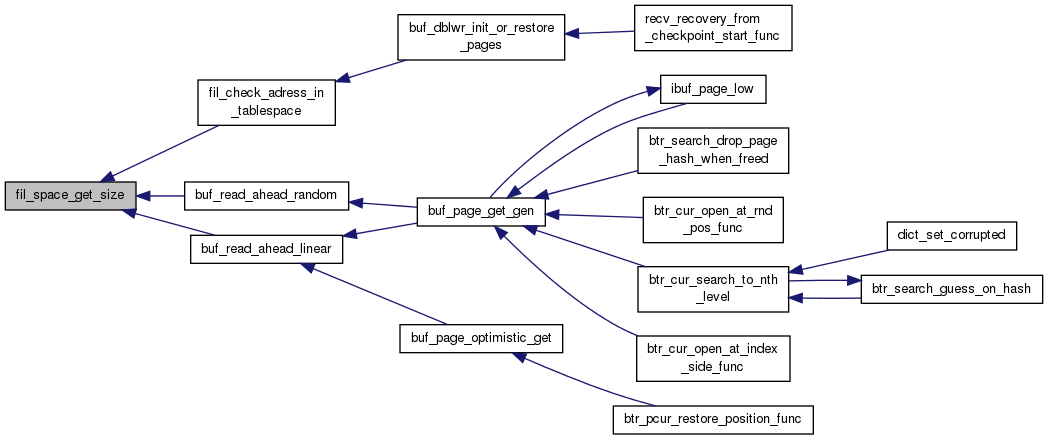
| UNIV_INLINE fil_space_t* fil_space_get_space | ( | ulint | id | ) |
Returns a pointer to the file_space_t that is in the memory cache associated with a space id. The caller must lock fil_system->mutex.
| id | in: space id |
Definition at line 1477 of file fil0fil.cc.

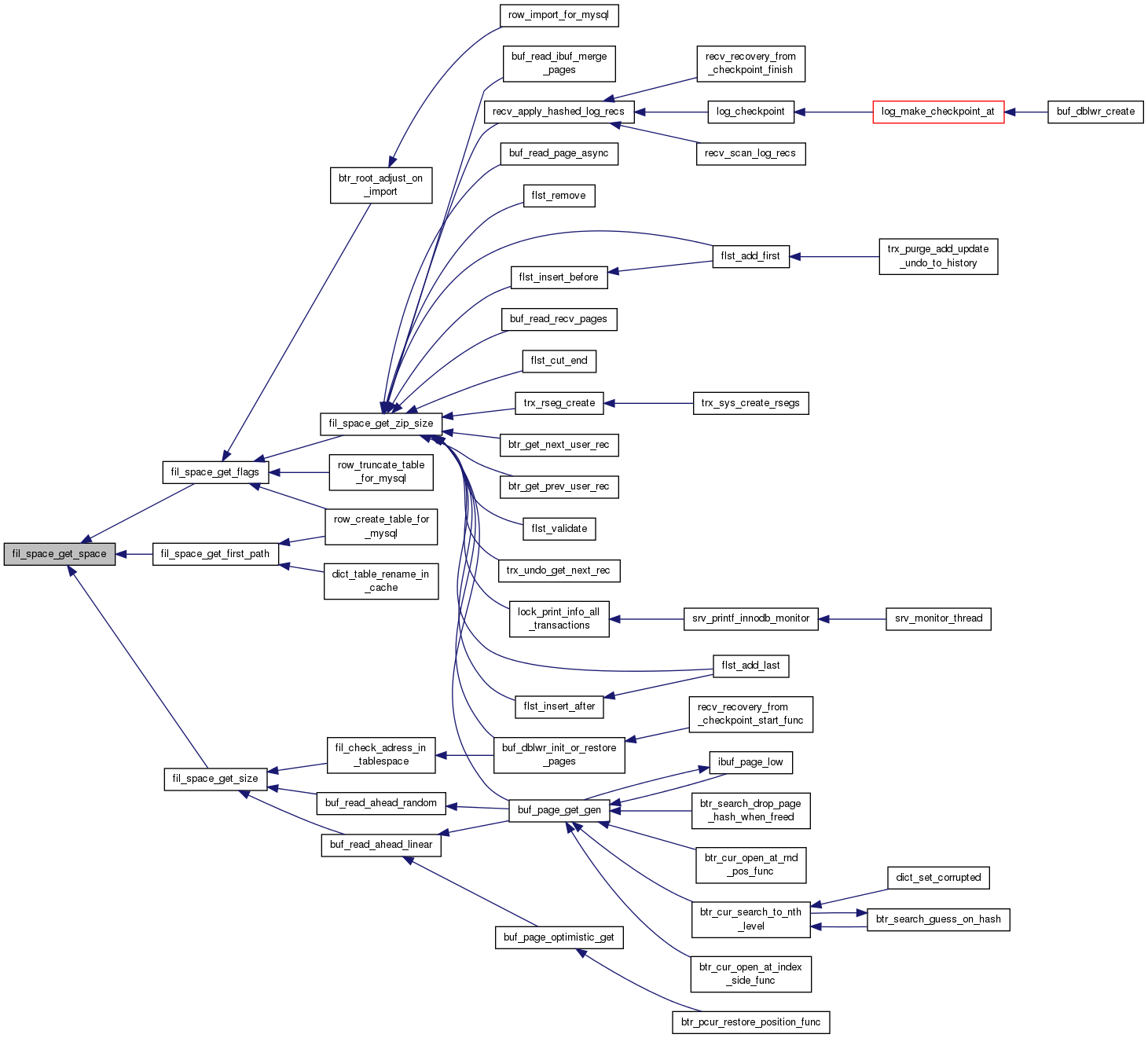
| UNIV_INTERN ulint fil_space_get_type | ( | ulint | id | ) |
Returns the type of a file space.
| id | in: space id |
Definition at line 578 of file fil0fil.cc.


| UNIV_INTERN ib_int64_t fil_space_get_version | ( | ulint | id | ) |
Returns the version number of a tablespace, -1 if not found.
| id | in: space id |
Definition at line 522 of file fil0fil.cc.

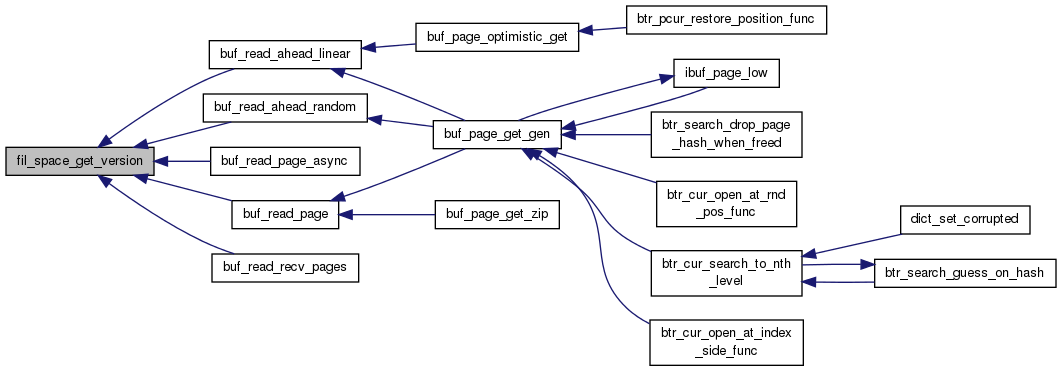
| UNIV_INTERN ulint fil_space_get_zip_size | ( | ulint | id | ) |
Returns the compressed page size of the space, or 0 if the space is not compressed. The tablespace must be cached in the memory cache.
| id | in: space id |
Definition at line 1637 of file fil0fil.cc.

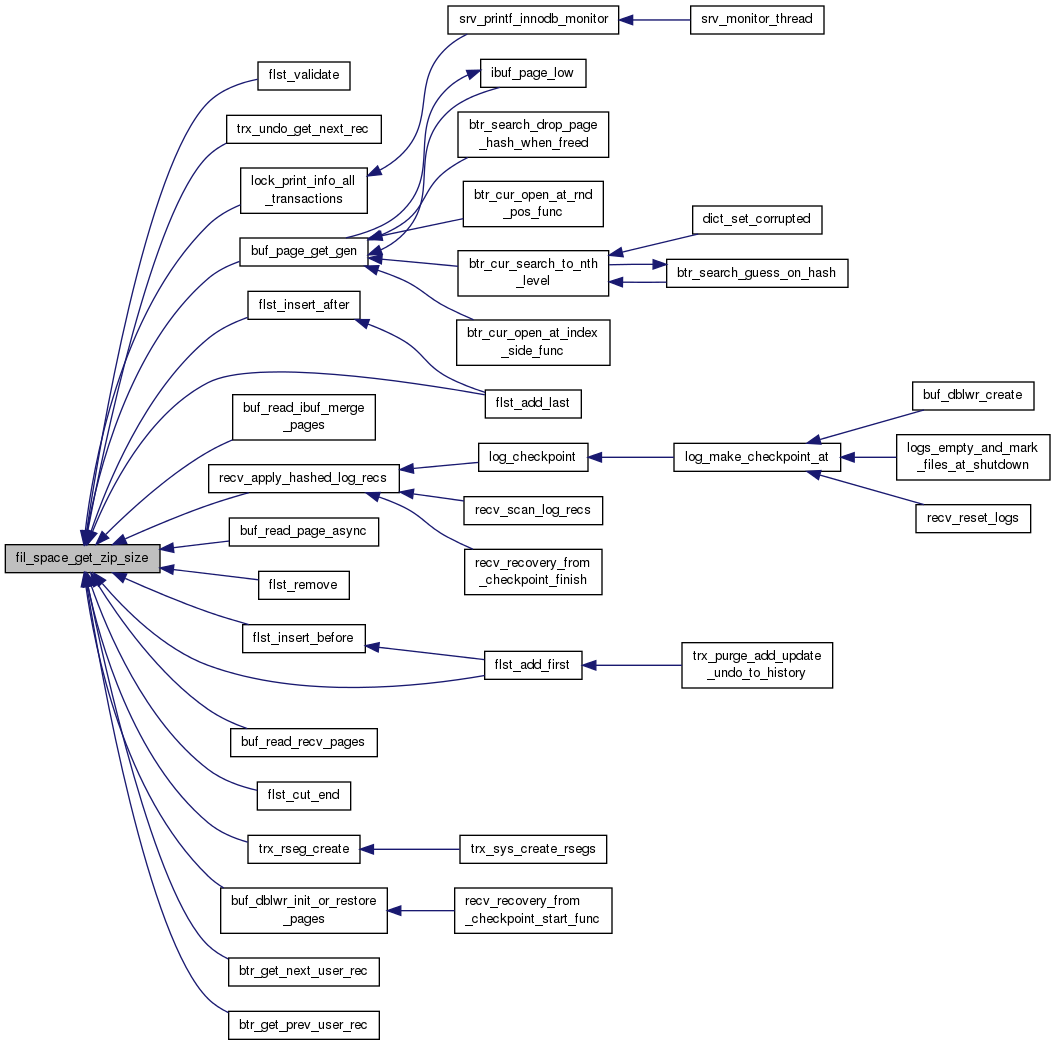
| UNIV_INTERN void fil_space_release_free_extents | ( | ulint | id, |
| ulint | n_reserved | ||
| ) |
Releases free extents in a file space.
| id | in: space id |
| n_reserved | in: how many one reserved |
Definition at line 5111 of file fil0fil.cc.

| UNIV_INTERN ibool fil_space_reserve_free_extents | ( | ulint | id, |
| ulint | n_free_now, | ||
| ulint | n_to_reserve | ||
| ) |
Tries to reserve free extents in a file space.
| id | in: space id |
| n_free_now | in: number of free extents now |
| n_to_reserve | in: how many one wants to reserve |
Definition at line 5078 of file fil0fil.cc.

| UNIV_INTERN ibool fil_tablespace_deleted_or_being_deleted_in_mem | ( | ulint | id, |
| ib_int64_t | version | ||
| ) |
Returns TRUE if a single-table tablespace does not exist in the memory cache, or is being deleted there.
| id | in: space id |
| version | in: tablespace_version should be this; if you pass -1 as the value of this, then this parameter is ignored |
Definition at line 4567 of file fil0fil.cc.

| UNIV_INTERN ibool fil_tablespace_exists_in_mem | ( | ulint | id | ) |
Returns TRUE if a single-table tablespace exists in the memory cache.
| id | in: space id |
Definition at line 4605 of file fil0fil.cc.


| UNIV_INTERN ibool fil_tablespace_is_being_deleted | ( | ulint | id | ) |
Returns TRUE if a single-table tablespace is being deleted.
| id | in: space id |
Definition at line 2818 of file fil0fil.cc.

| UNIV_INTERN dberr_t fil_tablespace_iterate | ( | dict_table_t * | table, |
| ulint | n_io_buffers, | ||
| PageCallback & | callback | ||
| ) |
Iterate over all the pages in the tablespace.
| table | - the table definiton in the server |
| n_io_buffers | - number of blocks to read and write together |
| callback | - functor that will do the page updates |
Add an extra page for compressed page scratch area.
Definition at line 6114 of file fil0fil.cc.
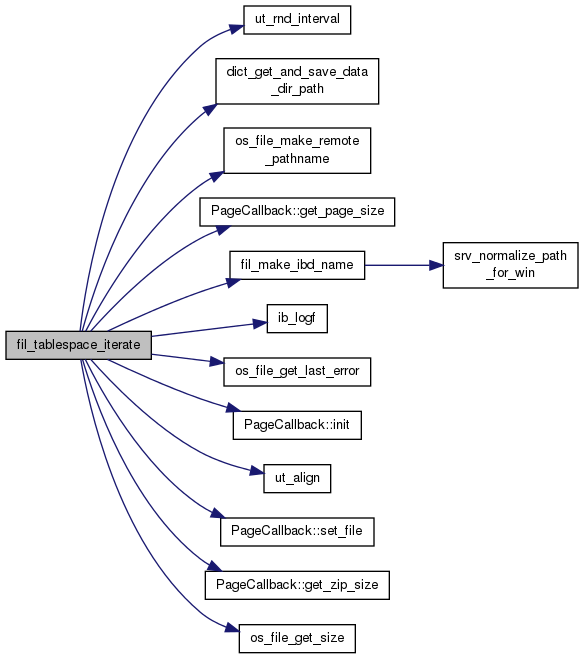

| UNIV_INTERN ibool fil_validate | ( | void | ) |
Checks the consistency of the tablespace cache.
Definition at line 5817 of file fil0fil.cc.

| UNIV_INLINE dberr_t fil_write | ( | bool | sync, |
| ulint | space_id, | ||
| ulint | zip_size, | ||
| ulint | block_offset, | ||
| ulint | byte_offset, | ||
| ulint | len, | ||
| void * | buf, | ||
| void * | message | ||
| ) |
Writes data to a space from a buffer. Remember that the possible incomplete blocks at the end of file are ignored: they are not taken into account when calculating the byte offset within a space.
| sync | in: true if synchronous aio is desired |
| space_id | in: space id |
| zip_size | in: compressed page size in bytes; 0 for uncompressed pages |
| block_offset | in: offset in number of blocks |
| byte_offset | in: remainder of offset in bytes; in aio this must be divisible by the OS block size |
| len | in: how many bytes to write; this must not cross a file boundary; in aio this must be a block size multiple |
| buf | in: buffer from which to write; in aio this must be appropriately aligned |
| message | in: message for aio handler if non-sync aio used, else ignored |
Definition at line 449 of file fil0fil.cc.
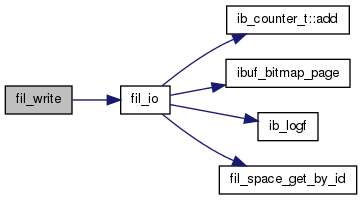

| UNIV_INTERN dberr_t fil_write_flushed_lsn_to_data_files | ( | lsn_t | lsn, |
| ulint | arch_log_no | ||
| ) |
Writes the flushed lsn and the latest archived log number to the page header of the first page of each data file in the system tablespace.
| lsn | in: lsn to write |
| arch_log_no | in: latest archived log file number |
Definition at line 1916 of file fil0fil.cc.

| UNIV_INTERN fil_addr_t fil_addr_null = {FIL_NULL, 0} |
The null file address
Definition at line 131 of file fil0fil.cc.
| UNIV_INTERN ulint fil_n_file_opened = 0 |
Number of files currently open
Definition at line 128 of file fil0fil.cc.
| UNIV_INTERN ulint fil_n_log_flushes = 0 |
The number of fsyncs done to the log
Definition at line 120 of file fil0fil.cc.
| UNIV_INTERN ulint fil_n_pending_log_flushes = 0 |
Number of pending redo log flushes
Definition at line 123 of file fil0fil.cc.
| UNIV_INTERN ulint fil_n_pending_tablespace_flushes = 0 |
Number of pending tablespace flushes
Definition at line 125 of file fil0fil.cc.
| UNIV_INTERN const char* fil_path_to_mysql_datadir = "." |
When mysqld is run, the default directory "." is the mysqld datadir,
but in the MySQL Embedded Server Library and ibbackup it is not the default directory, and we must set the base file path explicitly
Definition at line 117 of file fil0fil.cc.
| ulint lsn_t lsn |
in: lsn to write
Definition at line 1884 of file fil0fil.cc.
| ulint sum_of_sizes |
< in: space to write to in: combined size of previous files in space, in database pages
Definition at line 1884 of file fil0fil.cc.